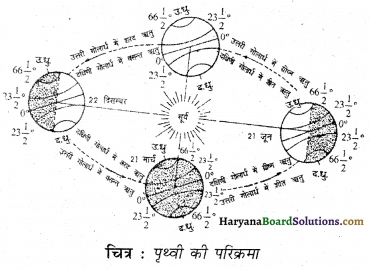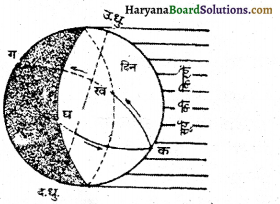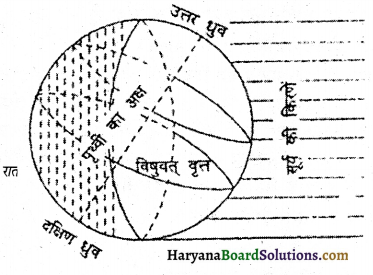HBSE 6th Class Social Science Solutions Geography Chapter 3 पृथ्वी की गतियां
Haryana State Board HBSE 6th Class Social Science Solutions Geography Chapter 3 पृथ्वी की गतियां Textbook Exercise Questions and Answers.
Haryana Board 6th Class Social Science Solutions Geography Chapter 3 पृथ्वी की गतियां
HBSE 6th Class Geography पृथ्वी की गतियां Textbook Questions and Answers
पृथ्वी की गतियां प्रश्न उत्तर HBSE 6th Class Social Science प्रश्न 1.
निम्नलिखित प्रश्नों के उत्तर संक्षेप में दीजिए:
(i) पृथ्वी के अक्ष का झुकाव कोण क्या है?
What is the angle of inclination of earth’s axis?
उत्तर:
661/2.
(ii) घूर्णन एवं परिक्रमण को परिभाषित करें।
Define rotation and revolution.
उत्तर:
- घूर्णन (Rotation) : पृथ्वी अपने अक्ष पर लट्टू की तरह घूमती है। एक घूर्णन का समय 24 घंटे है।
- परिक्रमण (Revolution) : पृथ्वी अपनी कक्षा में सूर्य का चक्कर 3651 दिन में पूरा करती है, इसे परिक्रमण कहते हैं।
(iii) लीप वर्ष क्या है?
What is a leap year?
उत्तर:
पृथ्वी अपनी एक परिक्रमा 365 दिन में पूरा करती है। सुविधा के लिये इसे हम 365 दिन कहते हैं, लेकिन 6 घंटे का समय प्रत्येक चौथे वर्ष में जुड़ जाता है जो 366 दिन का होता है। इसे ही अधिवर्ष कहते हैं।
![]()
(iv) उत्तर एवं दक्षिण अयनांतों में अंतर बताइए।
Differentiate between Summer and Winter Solstice.
उत्तर:
21 जून को उत्तरी गोलार्ध सूर्य के सामने झुका होता है। सूर्य की सीधी किरणें 23°.30′ उत्तर अक्षांश या कर्क वृत्त पर सीधी पड़ती हैं। इस दिन सूर्य की रोशनी इस गोलार्ध में अधिकतम समय के लिए प्राप्त होती है। इसके परिणामस्वरूप दिन लंबे तथा गर्म होते हैं। 21 जून की इस स्थिति, जब दोपहर के सूर्य की किरणें कर्क वृत्त में सिर के ऊपर पड़ती हैं, को उत्तर अयनांत कहते हैं। 22 दिसंबर को दक्षिणी गोलार्ध सूर्य के सामने झुका होता है। सूर्य मकर वृत्त (231/2° इ.) पर सीधा चमकता है। यह दक्षिणतम बिंदु है जहाँ सूर्य की किरणें सीधी चमकती हैं। इस समय दिन कम गर्म तथा रातें ठंडी होती हैं। इसे दक्षिण अयनात कहते हैं।
(v) विषुव क्या है? What is Equinox?
उत्तर:
23 सितंबर को सूर्य की किरणे विषुवत रेखा पर सीध १ चमकती हैं। इस तिथि को पूरे विश्व में दिन और रात बराबर होते हैं। इस तिथि को 12 घंटे का दिन और 12 घंटे की रात होती है। दिन रात के तापमान में ज्यादा अंतर नहीं होता इसलिए इसे शरद विषुव कहते हैं। यही प्रक्रिया 21 मार्च को घटती है जब पृथ्वी आगे बढ़ती हैं। 21 मार्च को विषुवत वृत्त फिर से सूर्य के सामने आ जाता है और सूर्य ठीक इसके ऊपर आ जाता है और सूर्य ठीक इसके ऊपर होता है। इस दिन पुनः दिन और रात बराबर हो जाते हैं। इसे उत्तरी गोलाध में वसंत विषुव कहते हैं।
(vi) दक्षिणी गोलार्ध में उत्तरी गोलार्ध की अपेक्षा उत्तर एवं दक्षिण का अयनांत अलग-अलग समय में होता है, क्यों ?
The Southern Hemisphere experience winter and summer solstice in different times than that of Northern Hemisphere. Why?
उत्तर:
पृथ्वी सूर्य की परिक्रमा करती है। परिक्रमा करते समय पृथ्वी का दक्षिणी गोलार्ध सूर्य के समीप तथा सामने आ जाता है जबकि उत्तरी गोलार्ध दूर होता जाता है। इस समय दक्षिणी गोलार्ध से सूर्य की किरणें मकर वृत्त पर सीधी पड़ती हैं। दिन की लंबाई अधिक होती है। यह स्थिति 22 दिसंबर को होती है। अत: दक्षिणी गोलार्ध में ग्रीष्म अयनांत तथा ग्रीष्म ऋतु होती है जबकि इस दिन उत्तरा गालाध म सबसे छोटा दिन तथा शांत ऋतु होती है।

चित्र : पृथ्वी की परिक्रमा
दक्षिणी गोलार्ध जब सूर्य से दूर होता है तो दिन की लंबाई कम होने लगती है। 21 जून को यहाँ सबसे छोटा दिन होता है। इसके विपरीत उत्तरी गोलार्ध में 21 जून को सबसे बड़ा दिन होता है। दक्षिणी गोलार्ध में 21 जून ग्रीष्म अयनांत का होता है। इस प्रकार दक्षिणी गोलार्ध में ग्रीष्म तथा शीत अयनांत उत्तरी गोलार्ध की अपेक्षा भिन्न समय में होता है।
(vii) ध्रुवों पर लगभग 6 महीने का दिन एवं 6 महीने की रात होती हैं, क्यों?
The Poles experience six months day and six months night. Why?
उत्तर:
पृथ्वी अपनी परिक्रमा 365/4 दिन में पूरा करती है। परिक्रमा के कारण ऋतुएँ बनती हैं। परिक्रमा के समय एक बार उत्तरी गोलार्ध सूर्य के सामने होता है तथा एक बार दक्षिणी गोलार्ध सूर्य के सामने होता है। इस समय सूर्य की किरणें कर्क वृत्त पर सीधी पड़ती हैं। अत: इन दिनों यहाँ सबसे लंबे दिन होते हैं। क्योंकि पृथ्वी ध्रुवों पर कुछ चपटी है इसलिये वहाँ छः महीने तक सूर्य की किरणें चमकती हैं इसके विपरीत दूसरे गोलार्ध में अंधेरा अथवा रात्रि होती है।
![]()
Prithvi Ki Gatiya HBSE 6th Class Social Science प्रश्न 2.
सही उत्तर चिह्नित (√) कीजिए:
Tick the correct answers :
(i) पृथ्वी की सूर्य के चारों ओर की गति को कहा जाता है:
(क) घूर्णन
(ख) परिक्रमण
(ग) झुकाव
उत्तर:
(ख) परिक्रमण।
(ii) सूर्य की सीधी किरणें विषुवत् वृत्त पर किस दिन पड़ती हैं:
(क) 21 मार्च को
(ख) 21 जून को
(ग) 22 दिसंबर को
उत्तर:
(क) 21 मार्च को।
(ii) गर्मी में क्रिसमस का पर्व कहाँ मनाया जाता है :
(क) जापान
(ख) भारत
(ग) ऑस्ट्रेलिया
उत्तर:
(ग) आस्ट्रेलिया में।
(iv) ऋतुओं में परिवर्तन पृथ्वी की किस गति के कारण होता है:
(क) घूर्णन
(ख) परिक्रमण
(ग) गुरुत्वाकर्षण
उत्तर:
(ख) परिक्रमण।
Prithvi Ki Gatiya Class 6 HBSE Social Science प्रश्न 3.
खाली स्थान भरें:
Fill in the blanks:
(i) एक लीप वर्ष में दिनों की संख्या —————- होती है।
(ii) पृथ्वी की प्रतिदिन की गति को —————- कहते हैं।
(iii) पृथ्वी सूर्य के चारों ओर —————- कक्षा में घूमती है।
(iv) 21 जून को सूर्य की किरणें —————- रेखा पर सीधी पड़ती हैं।
(v) m ऋतु में दिन छोटे होते हैं।
उत्तर:
(i) 366
(ii) घूर्णन
(iii) अपनी
(iv) कर्क
(v) शीत
आओ कुछ करें:
1. पृथ्वी के अपने अक्ष पर झुकाव को दर्शाने के लिए एक चित्र बनाइए।
2, प्रत्येक महीने की 21 तारीख को होने वाले सूर्योदय एवं सूर्यास्त के समयों को स्थानीय समाचारपत्र की सहायता से लिखिए तथा निम्नलिखित के उत्तर दीजिए:
- किस महीने के दिन सबसे छोटे हैं ?
- किन महीनों में दिन एवं रात लगभग बराबर होते हैं?
HBSE 6th Class Geography पृथ्वी की गतियां Important Questions and Answers
अति लघु उत्तरात्मक प्रश्न
पृथ्वी की गतियां कक्षा 6 HBSE Social Science प्रश्न उत्तर प्रश्न 1.
पृथ्वी की दो गतियाँ लिखो। Write two motions of the earth.
उत्तर:
पृथ्वी की दो गतियाँ हैं:
- घूर्णन तथा
- परिक्रमण।
पृथ्वी की गतियाँ Class 6 HBSE Social Science प्रश्न उत्तर प्रश्न 2.
अधिवर्ष किसे कहते हैं?
What is leap year?
उत्तर:
पृथ्वी अपनी परिक्रमा 365 दिन में पूरा करती है। सुविधा के लिए इसे हम 365 दिन मानते हैं। प्रतिवर्ष छः घंटे चौथे वर्ष मिलकर एक दिन बन पाते हैं। अत: यह वर्ष 366 दिन का होता है। इसे ही अधिवर्ष कहते हैं।
![]()
पृथ्वी की गतियाँ HBSE 6th Class Social Science प्रश्न 3.
ऋतु चक्र के लिये कौन से दो कारक उत्तरदायी है?
What are the two factors responsible for the change of seasons ?
उत्तर:
पृथ्वी का अपने अक्ष पर झुकाव तथा पृथ्वी द्वारा सूर्य की परिक्रमा वे दो कारक हैं जो ऋतु चक्र के लिये उत्तरदायी हैं।
प्रश्न 4.
घूर्णन का क्या प्रभाव होता है?
What is effect of rotation?
उत्तर:
पृथ्वी के घूर्णन से दिन तथा रात बनते हैं।
प्रश्न 5.
चार ऋतुओं के नाम बताओ।
Name the four seasons.
उत्तर:
चार ऋतुओं के नाम इस प्रकार हैं:
- ग्रीष्म ऋतु
- शीत ऋतु
- शरद ऋतु तथा
- बसंत
प्रश्न 6.
प्रकाश वृत्त क्या है?
What is circle of illumination?
उत्तर:
प्रकाश वृत्त पृथ्वी को दिन और रात में विभाजित करता है।
प्रश्न 7.
उत्तरी ध्रुव पर कब छ: महीने का दिन होता है?
When the North Pole experience the six month day?
उत्तर:
जब सूर्य की किरणें कर्क वृत्त पर लंबवत् पड़ती हैं तथा उत्तरी गोलार्ध सूर्य के सामने झुका होता है। यह स्थिति ग्रीष्म ऋतु में होती है।
लघु उत्तरात्मक प्रश्न
प्रश्न 1.
घूर्णन का क्या प्रभाव होता है?
What is the effect of rotation?
उत्तर:
घूर्णन का प्रभाव दिन और रात के बनने पर होता है। पृथ्वी अपने अक्ष पर एक घूर्णन 24 घंटे में पुरा करती है जिससे पृथ्वी का प्रत्येक भाग बारी-बारी से सूर्य के सम्मुख आता-जाता है। जो भाग सूर्य के सम्मुख आता है उसे वहाँ दिन तथा जो भाग सूर्य से परे होता है वह वहाँ रात कहलाती है।
![]()
प्रश्न 2.
अंतर स्पष्ट करो:
Distinguish between:
(i) प्रातःकाल तथा सायंकाल।
Morning and Evening,
उत्तर:
प्रातःकाल (Morning): पृथ्वी अपने अक्ष पर पश्चिम से पूर्व की ओर घूर्णन करती है। जैसे ही पृथ्वी का कोई भाग सूर्य के सामने आता है सूर्य का प्रकाश उस पर पड़ता है। यह ऊषा काल कहलाता है तथा जैसे ही वह स्थान कुछ और नजदीक आता है सूर्य की किरणें उस स्थान पर पड़ने लगती हैं, यह प्रात:काल होता है। इस समय सूर्य के किरणें तिरछी होती हैं। इस समय सूर्य क्षितिज पर होता है।
सायंकाल (Evening) : दोपहर के समय सूर्य की किरणें लंबवत् पड़ती हैं। दोपहर के बाद पुनः सूर्य क्षितिज की ओर जाने लगता है। किरणें फिर तिरछी होने लगती हैं, यह सायंकाल होता है। सायंकाल के पश्चात् कुछ प्रकाश रहता है, जिसे हम संध्या काल कहते हैं।
(ii) घूर्णन तथा परिक्रमण।
Rotation and Revolution.
उत्तर:
घूर्णन (Rotation) : पृथ्वी हमें स्थिर दिखाई देती है। लेकिन ऐसा नहीं है। यह अपने अक्ष पर लटू की भांति घूमती रहती है। एक घूर्णन का समय 24 घंटे होता है। पृथ्वी घूर्णन के साथ सूर्य की परिक्रमा भी करती है। घूर्णन से दिन तथा रात बनते हैं।
परिक्रमण (Revolution) : पृथ्वी अपने अक्ष पर घूमती हुई सूर्य की परिक्रमा करती है। यह परिक्रमा 365% दिन में पूरा करती है। इसे परिक्रमण कहते हैं। पृथ्वी की परिक्रमा से ऋतु परिवर्तन होता है।
(iii) संक्रांति तथा विषुव।
Solstice and Equinox
उत्तर:
संक्रांति या अयनांत (Solstice) : वर्ष की वे तिथियाँ हैं, जिनमें सूर्य की सीधी किरणें भूमध्य रेखा से उत्तर या दक्षिण की ओर सर्वाधिक दूरी पर कर्क या मकर वृत्त के सीधे ऊपर होती हैं। उत्तरी अयनांत के समय 21 जून को सूर्य की किरणें कर्क रेखा के ऊपर लंबवत् होती हैं। इस समय उत्तरी गोलार्ध में दिन बड़े तथा रातें छोटी होती हैं। इसके विपरीत दक्षिणी गोलार्ध में दिन बड़े तथा रातें लंबी होती हैं। यह स्थिति दक्षिणी गोलार्द्ध में 22 दिसंबर को होती है।
विषुव (Equinox) : वर्ष के दो दिन ऐसे होते हैं, जबकि पृथ्वी पर 12 घंटे का दिन तथा 12 घंटे की रात होती है। यह 21 मार्च तथा 23 सितंबर को होता है। 21 मार्च को बसंत विषुव तथा 23 सितंबर को शरद विषुव होता है।
प्रश्न 3.
उत्तरी गोलार्ध में कब और क्यों ग्रीष्म ऋतु होती
When does the Northern Hemisphere have summer and why?
उत्तर:
उत्तरी गोलार्द्ध में ग्रीष्म की ऋतु मई और जून में होती है। पृथ्वी अपनी परिक्रमा करते समय सूर्य की ओर झुक जाती है अर्थात् उत्तरी ध्रुव सूर्य की ओर झुक जाता है, जबकि दक्षिणी ध्रुव सूर्य से दूर होता है। उत्तरी गोलार्ध में सूर्य की किरणें कर्क वृत्त पर सीधी पड़ती हैं। अत: उत्तरी गोलार्ध का अधिकतर भाग अधिक प्रकाश और ऊष्मा प्राप्त करता है। इसलिये इन दिनों उत्तरी गोलार्ध में ग्रीष्म की ऋतु होती है।
प्रश्न 4.
21 मार्च तथा 23 सितंबर को दिन और रात समान क्यों होते हैं?
Why are days and nights equal on 21st March and 23rd September?
उत्तर:
23 सितंबर और 21 मार्च को सूर्य की किरणें विषुवत वृत्त पर लंबवत् पड़ती हैं। इस समय दोनों ध्रुवों पर भी सूर्य का प्रकाश रहता है। अत: पृथ्वी के दोनों गोलार्ध के आधे भाग प्रकाशित हो रहे हैं। यही कारण है कि इन दो तिथियों को सारे संसार में रात तथा दिन बराबर होते हैं।
प्रश्न 5.
पृथ्वी के घूर्णन से दिन-रात किस प्रकार बनते हैं?
How is the rotation of the earth responsible for causing days and nights?
उत्तर:
अपने अक्ष पर पृथ्वी 24 घंटे में एक चक्कर पूरा कर लेती है। इसे घूर्णन कहते हैं। अपने अक्ष पर घूमते हुये पृथ्वी का आधा भाग सूर्य के सामने होता है तथा दूसरा आधा भाग सूर्य के पीछे रहता है। यह क्रिया लगातार बदलती रहती है।

चित्र : पृथ्वी के अक्ष का झकाव और दिन तथा रात्रि के समय में अंतर
अतः पृथ्वी के प्रकाश वाले भाग में दिन तथा अंधेरे वाले भाग में रात रहती है। पृथ्वी के घूर्णन के कारण उसके सभी भागों में क्रमशः दिन और रात होते रहते हैं।
प्रश्न 6.
लीप वर्ष कब होता है?
When do we observe a leap year?
उत्तर:
पृथ्वी सूर्य की परिक्रमा 365 दिन 6 घंटे में करती है। अपनी सुविधा के लिये हम इसे 365 दिन मानते हैं। अत: चार वर्ष में 24 घंटे पर एक दिन का अंतर पड़ जाता है। अतः प्रति चौथे वर्ष में हम एक दिन जोड़ देते हैं। इस प्रकार हर चौथा वर्ष 366 दिन का होता है। इसे ही अधिवर्ष (लीप वर्ष) कहते हैं। यह अतिरिक्त दिन फरवरी के माह में जड़ता है जिसमें 29 दिन होते हैं। अतः प्रति चौथे वर्ष फरवरी 29 दिन की होती है।
![]()
प्रश्न 7.
दिन और रात की अवधि में अंतर क्यों होता है?
Why do the days and nights vary in length?
उत्तर :
दिन और रात की अवधि सदैव समान नहीं होती, कभी दिन लंबे होते हैं तो कभी रातें। दिन और रात की अवधि में अंतर पृथ्वी की अपने अंडाकार मार्ग में परिक्रमा तथा इसका अपने अक्ष पर 661/2° के कोण पर झुकना है। परिक्रमा करते समय पृथ्वी का उत्तरी गोलार्ध सूर्य के सामने आ जाता है और सूर्य की किरणें कर्क वृत्त पर लंबवत् पड़ती हैं। यह स्थिति 21 जून को होती है। इस समय उत्तरी गोलार्ध में देर तक सूर्य का प्रकाश रहता है।

चित्र : पृथ्वी के अक्ष का झुकाव तथा दिन व
इसलिये दिन लंबे होते हैं तथा रातें छोटी होती हैं। इसी प्रकार जब पृथ्वी का दक्षिणी गोलार्ध सूर्य के सम्मुख आता है तो सूर्य की किरणे मकर वृत्त पर लंबवत् पड़ती हैं और वहाँ सूर्य का प्रकाश देर तक रहता है। यह स्थिति 22 दिसंबर को होती है। इसलिये दक्षिणी गोलार्द्ध में दिन लंबे तथा रातें छोटी होती हैं। इस प्रकार पृथ्वी पर दिन और रात की अवधि में अंतर रहता है।
पृथ्वी की गतियां Class 6 HBSE Notes in Hindi
- घूर्णन (Rotation) : पृथ्वी अपने अक्ष पर 24 घंटे में एक चक्कर पूरा करती है जिसे घूर्णन कहते हैं।
- परिक्रमण (Revolution) : पृथ्वी का अपने अक्ष पर सूर्य के चारों ओर चक्कर लगाना परिक्रमण कहलाता है जो : में पूरा होता है।
- अधिवर्ष (Leap Year) : पृथ्वी अपना परिक्रमण 365 दिन 6 घंटे में पूरा करती है। 4 वर्ष में 6 घंटे का समय ए जाता है अत: उस वर्ष 366 दिन हो जाते हैं, इसे अधिवर्ष कहते हैं। \
- प्रकाश वृत्त (Circle of illumination) : पृथ्वी को दो भागों में रात तथा दिन के रूप में विभाजित करने वाले वृत्त वृत्त कहते हैं।
- ऊषाकाल (Dawn) : सूर्य के उगने से ठीक पूर्व का समय ऊषाकाल कहलाता है।
- संध्याकाल (Dusk) : सूर्यास्त के ठीक पश्चात् के समय को संध्याकाल कहते हैं।
- पृथ्वी का अपने अक्ष पर झुकाव (Inctination of the Earth on its axis) : सूर्य का चक्कर लगाते समय पृथ्वी ओर झुकी रहती है। इस झुकाव को पृथ्वी का अपने अक्ष पर झुकाव कहते हैं।
HBSE 6th Class Social Science Solutions Geography Chapter 3 पृथ्वी की गतियां Read More »